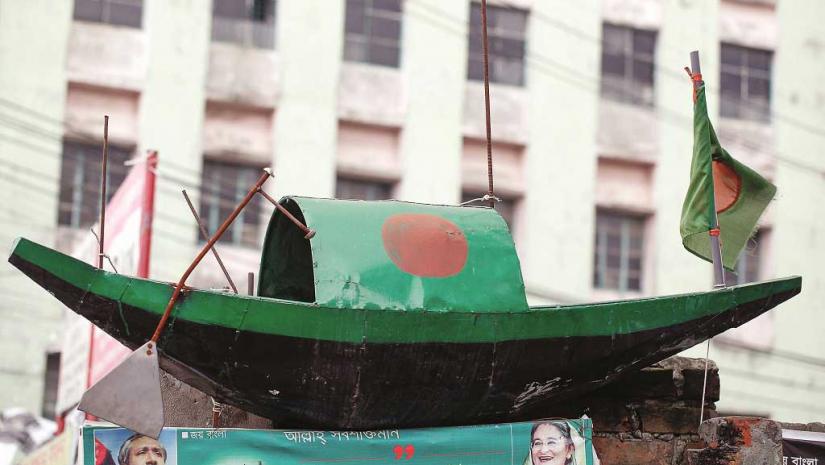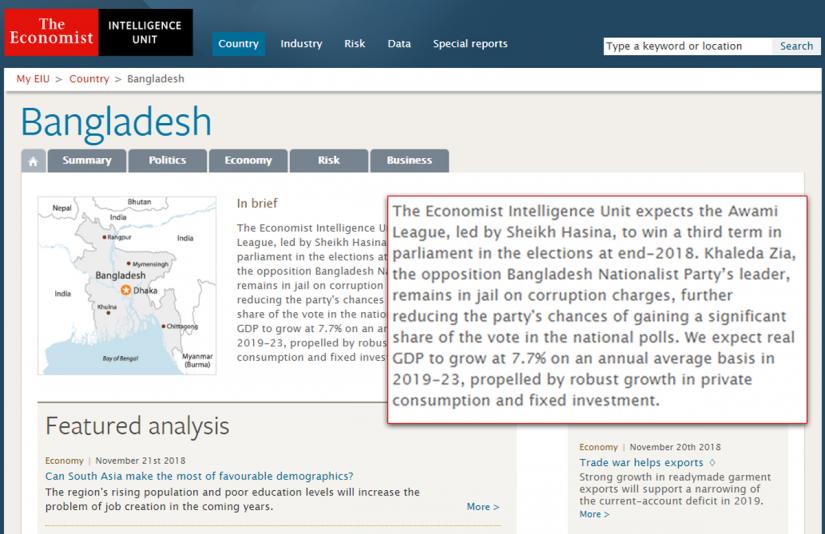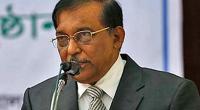 The Economist Intelligence Unit (EIU) predicts that the Awami League will return to power in the 11th national election, slated for Dec 30, clinching majority of the seats in the parliament.
The Economist Intelligence Unit (EIU) predicts that the Awami League will return to power in the 11th national election, slated for Dec 30, clinching majority of the seats in the parliament.
In its latest briefing note for Bangladesh, the EIU—research and analysis division of the Economist Group — said the party has overseen solid economic growth and its re-election will be assisted by patronage at the local level.
According to the forecast by the London-based group, economic growth would remain robust and real GDP will grow by an average of 7.7 percent per year between 2018-19 and 2022-23, bolstered by strong increases in private consumption and gross fixed investment.
The report also specifically mentions the reputation of Prime Minister Sheikh Hasina as being the key factor in the next election, stating that she remains the most popular candidate, according to numerous local opinion polls. The country’s impressive record of economic growth and socio-economic development under the Awami League administration, coupled with a lack of an effective opposition election campaign, will be enough to fend off any challenge posed by the BNP or the Jatiya Oikya Front more broadly, the EIU said.
The country’s impressive record of economic growth and socio-economic development under the Awami League administration, coupled with a lack of an effective opposition election campaign, will be enough to fend off any challenge posed by the BNP or the Jatiya Oikya Front more broadly, the EIU said.
The report, released this month, adds that a win for the Awami League will be important in sustaining foreign investment, and will also support the administration’s drive to expand and deepen private sector participation in the economy.
Following such a win, Bangladesh is expected to continue to exploit its strategically important location on the Bay of Bengal to extract concessions and economic assistance from India, China and Japan.
However, relations with Myanmar will remain tense in the medium term owing to the Rohingya crisis which will remain severe, at least in the early part of the forecast period.
The political environment will be characterised by frequent bouts of social unrest during the 2019-23 forecast period, says the report.
Along with the immediate threat of terrorist attacks, opposition protests and public demonstrations will pose risks to political stability, it said.
 National
National
41322 hour(s) 30 minute(s) ago ;
Afternoon 01:25 ; Friday ; Jul 04, 2025
EIU predicts election win for Awami League
Send
Bangla Tribune Desk
Published : 17:16, Dec 12, 2018 | Updated : 17:26, Dec 12, 2018
Published : 17:16, Dec 12, 2018 | Updated : 17:26, Dec 12, 2018
0 ...0 ...
/zmi/
Topics: Top Stories
- KOICA donates medical supplies to BSMMU
- 5 more flights to take back British nationals to London
- Covid19: Rajarbagh, Mohammadpur worst affected
- Momen joins UN solidarity song over COVID-19 combat
- Covid-19: OIC to hold special meeting
- WFP begins food distribution in Cox’s Bazar
- WFP begins food distribution in Cox’s Bazar
- 290 return home to Australia
- Third charter flight for US citizens to return home
- Dhaka proposes to postpone D8 Summit
Unauthorized use of news, image, information, etc published by Bangla Tribune is punishable by copyright law. Appropriate legal steps will be taken by the management against any person or body that infringes those laws.
Bangla Tribune is one of the most revered online newspapers in Bangladesh, due to its reputation of neutral coverage and incisive analysis.
F R Tower, 8/C Panthapath, Shukrabad, Dhaka-1207 | Phone: 58151324; 58151326, Fax: 58151329 | Mob: 01730794527, 01730794528


